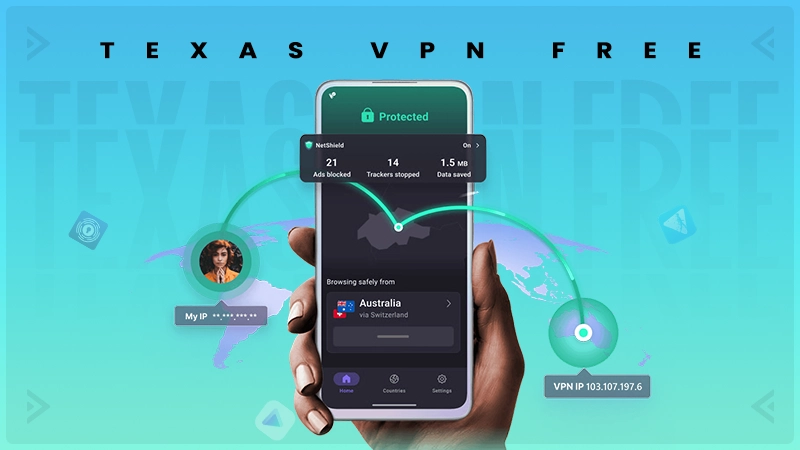Remote access is the best option for an individual or daily home use. As it connects its users securely with the private network and hides all its confidential information across the internet.
Remote Access VPN vs. Site-to-Site VPN: Key Differences

The remote access and site-to-site VPN are two common types of virtual private networks, but they both have their distinct characteristics.
In simple terms, the main difference is that a remote access VPN connects its user to the private network. Conversely, a site-to-site VPN integrates two or more networks securely.
However, both of them have identical functionality and responsibilities to perform.
Therefore, in this article, you will learn the precise meaning of these two private networks with their pros and cons, differences, and similarities in depth. So, read it attentively.
Key Takeaways:
- Remote Access VPN is for individual use, whereas Site-to-Site VPN entirely connects multiple networks from distinct locations.
- Both keep your data safe by using powerful encryption.
- Remote Access VPN is simple and less expensive to set up; Site-to-Site requires a complex process for installation.
- Select remote access for remote work and site-to-site for connecting multiple teams across different cities.
What Does VPN Mean?

A VPN, or virtual private network, is an innovative tool that maintains your privacy and safety across the internet. It eventually works by hiding your IP address, so that you can browse the web anonymously.
Furthermore, it encrypts your internet connection, making it unreadable for public Wi-Fi or hackers.
Simply put, a VPN constructs a secure connection between your device and the internet, protecting your data from any unauthorized access.
Thus, there are numerous benefits of a VPN that you can acquire. This may include:
- Hides your IP address and device’s location.
- Secure your confidential data on public Wi-Fi.
- Provides access to blocked or private websites.
- Help to browse the information from other countries.
Briefly, we can say that using an effective VPN gives you more control over your online presence without any hassle.
What is Remote Access VPN?

In a remote access VPN, you can securely connect to the private network from almost any location in the world. For instance, often used by corporate employees to access their company’s files while working from home or travelling.
By employing this VPN feature, it protects the confidential data of its user and secures their connection. Eventually, this helps businesses, freelancers, and others to be secure and facilitate their work across several locations.
Advantages and Disadvantages of Remote Access VPN
As aforementioned, a remote access VPN allows its users to easily connect with the private network from various locations. But just like any other technology, this encrypted connection is also associated with both advantages and disadvantages.
Let’s learn about them by reviewing the table below.
| Advantages | Disadvantages |
| Provides a secure connection that encrypts data for privacy and security. | Encryption can slow down the overall speed of the private connection. |
| Enable remote work from anywhere safely. | Some VPNs may require additional software to operate. |
| Furnish a flexible solution that can be accessed from any internet connection. | Users may need special training or operating guidelines to employ the remote access VPN. |
| Requires less management and complex configurations. | |
| It can be used on multiple devices such as laptops, mobiles, and tablets. | |
| It allows multiple users. |
Therefore, this advanced VPN is the best choice for companies’ work. It assists in boosting the growth of the business as it keeps their data secure and allows their employees to stay productive from anywhere.
What is Site-to-Site VPN?

A site-to-site VPN is broadly known as the router-to-router VPN. It securely connects two or more networks over the Internet. Commonly, it is used by large-scale companies that are operating multiple offices across the globe.
For instance, a software manufacturer connects its Singapore and London offices’ local networks, so that employees from both locations can access their files and share them on internal systems securely.
Advantages and Disadvantages of Site-to-Site VPN
The site-to-site VPN easily connects offices in different locations using the secure network. Despite its numerous benefits, it also comes with some possible drawbacks.
Examine the table below to learn more about the pros and cons of site-to-site VPN.
| Advantages | Disadvantages |
| Ensures a secure connection throughout multiple networks. | Involves complex configuration and management procedures. |
| Allows it user to access the resources located in another location. | May need additional hardware to use this VPN. |
| Encrypts the data between the networks to maintain security. | Hard to diagnose a network issue between different websites. |
| It is cost-effective for big companies that hold large interconnecting networks. | Does not allow multiple users. |
| Provides higher reliability and better network performance. |
Briefly, site-to-site VPN is an ideal option for a business that operates from various locations. As it provides the safest and the secure way to keep all offices connected.
What are the Key Difference Between Remote Access VPN and Site-to-Site VPN?

Comprehending the primary difference between these two VPNs will empower you to choose the right private connection for personal or business use.
Thus, examine the table below and determine the difference accurately.
| Features | Remote Access VPN | Site-to-Site VPN |
| Definition | Allows an individual to connect with the private network from any location. | Securely connects two or more networks over the internet. |
| Example | An employee connects their device to the office network while working from home. | Connects the business headquarters with the different branches of the same company. |
| Users | Best for remote employees or individuals. | Ideal for companies that run multiple office locations. |
| Connection Type | Connect one device to a private network. | Connects one entire network to another. |
| Setup | Simple setup; requires additional software to get installed. | Complex setup; requires configuration on Wi-Fi routers or firewalls. |
| Security | Offers encryption for an individual device. | Encrypts traffic within two networks. |
| Technology | Supports IPsec technology. | Supports SSL and IPsec technology. |
On the whole, both remote access VPN and site-to-site VPN improve internet security and provide a private network. But they are designed for different requirements.
So, selecting the right private network depends on whether your goal is individual access or router-to-router connectivity.
What are the Potential Similarities Between Remote Access VPN and Site-to-Site VPN?

Remote access VPN and site-to-site VPN work differently, but they still have many things in common. For instance, secure network transmission keeps your confidential information safe, and many more.
Thus, here we are highlighting some identical features you may find in both VPNs. Read them attentively.
- Both use encryption to protect your personal or business data from any sort of third-party access.
- Ensures secure communication over public networks.
- Hides your data and IP address from unauthorized networks.
- Employ secure protocols, like SSL, GRE, and IPsec.
- Creates trusted, secure communication channels between its users and networks.
Although both VPNs are meant to serve different kinds of users, they encompass many common important characteristics. Therefore, whether you choose a remote access VPN or a router-to-router VPN, you will surely be receiving the aforementioned features.
Bottom Line
In conclusion, understanding the key difference between remote access VPN and site-to-site VPN is crucial for your business.
However, they are both recognized as a virtual private network provider, but still hold distinct setup procedures, scalability, purpose, and user access.
Lastly, after reading this article now you may have cleared all your doubts regarding these two powerful VPNs.
By clearly comparing remote access and site-to-site, you can now confidently choose the best one for you. So that you can secure your network, whether you are working from your favorite restaurants or connecting with your office branch.
Remember, the right one can make a big difference!
Frequently Asked Questions
Which VPN is best for home use?
Is using the site-to-site VPN safe?
Yes, employing this virtual private network is entirely safe. The large-scale business that works from different locations can completely trust a site-to-site VPN. As this network provider connects all the networks immensely and allows multiple users to access the data from the internal system safely.
What are remote access VPN and site-to-site VPN?
Remote access connects an individual device to the private network across diverse locations. Whereas, site-to-site connects multiple users within the shared network.





